- Jos Pauwels, the mystery of the pointillist painter who never existed
WHAT. Every year, tons of geese are slaughtered in Germany, the main protagonist on the tables during Christmas Eve dinner.
WHO. This time, the tradition has pitted animal activists against German farmers, who claim that their animals have a better quality of life than those imported from Eastern Europe.
WHY? Domestic producers denounce that the "foreign geese" are a fraud and of poorer quality.
The countdown has begun for the tens of thousands of geese that year after year are slaughtered for Christmas so that "humans can use their meat, organs and feathers", denounce animal activists. It is known that feathers are not cooked, but organizations are taking advantage of the Christmas awareness campaign to attack the textile industry.
It's hard for them and not because down duvets weigh less and are warmer. The goose is one of the great protagonists on the table of the Germans. Last year, more than 500,000 were killed, but since the statistics do not record them by units but in tons, we are talking about 20,000 tons. The fact that 90% of that amount was imported from Eastern Europe does not count for animal rights activists. The nationality of the goose to be carved on Christmas Eve only matters to the national producers and they have launched their own campaign, with a rather protectionist whiff of it. "Watch out for foreign geese, there's a lot of fraud in the labels," they say.
Many retailers, German farmers warn, resort to fraudulent methods and sell products imported from extensive farms in Poland, France, Hungary and Bulgaria as domestic. And unlike the imported ones, "our geese were slowly fattened, got enough exercise, and had a comparatively good goose life," says the Consumer Advice Center. "So if you want to enjoy a good goose at Christmas, you need to pay special attention to where it comes from. If it's German, it will indicate fair breeding." Because "a German organic goose usually lives six months until it is slaughtered. He is fed green fodder, gets daily exercise, and always has access to water. All of these factors have a positive impact on quality."
And in the price, of course. The German goose costs about 20 euros per kilo and the imported goose, between 5 and 8 euros, always talking about specimens weighing around 3.5 kilos because the goose, as it looks good, is roasted whole. That's why "to guarantee yourself a good German goose at Christmas, order in advance and these first days of Advent is the perfect time. The demand is so high that they are often sold out long before the holidays," the producers repeat.
For animal rights activists, it doesn't matter whether they eat a goose that lived happily in Germany or one that hatched in Poland. The point is to eat vegan. "Organic farming is not much better. It often lacks outdoor water areas, as sometimes it is only stipulated that geese should have the opportunity to wet their heads with water. And even in these forms of breeding, life usually begins in hostile farms and ends brutally in the slaughterhouse at eight months at the latest, usually in St. Maarten – like pigs – or Christmas."
They remember that males and females live in crowded sterile sheds with the sole purpose of producing many eggs. "Chicks are never born in lovingly built nests, but anonymously in incubators. These birds, which naturally live in close family groups, are denied the opportunity to be a mother or father," they explain. And once in the slaughterhouse, "the animals are hung upside down by their sensitive legs to anesthetize them and then dragged through an electric toilet. Their throats are then slit to bleed them out regardless of whether the anesthesia applied to them worked perfectly, or if the partner of the sacrificed goose witnesses the slaughter, as these social animals are known to cry, like humans, when they lose someone in the family."
The ending of the goose Christmas tale depends on who tells it, but it will most likely end up on the dinner table. About 40,000 have already been ordered.
- Poland
- Germany
- Bulgaria
- Hungary
- France

